This post may include affiliate links, which means we make a small commission on any sales. This commission helps Feminist Book Club pay our contributors, so thanks for supporting small, independent media!
I’ve spent the past decade being angry. Angry at the neighbor who is always flying some new and hateful flag in front of his house. Angry at the relatives who have made casually bigoted remarks at holiday gatherings. Angry at the community members who have been apathetic about COVID safety protocols because they saw it as an inconvenience. Angry at those behind every disinformation campaign. Angry at people I otherwise love.
I can’t believe it’s been four years since I wrote about my mother’s reaction to my Black Lives Matter lawn sign.
I can’t believe I’m still so angry.
If you read that post from four years ago, you know I’m terrible at remaining calm and collected while discussing contentious topics with those who don’t agree with me. Like, I am the absolute worst.
But being angry all the time has made me so tired. And it hasn’t accomplished a dang thing.
Instead of being consumed by hate, instead of shouting past each other, instead of making personal attacks (which only serve to shut the other person down), how might we turn toward each other instead?
I’ve been reading a ton of books on this topic lately, desperate for the secret key to fixing what feels broken inside me, and I’ve found that each of the ones below has something useful to offer.
I Never Thought of It That Way: How to Have Fearlessly Curious Conversations in Dangerously Divided Times by Mónica Guzmán
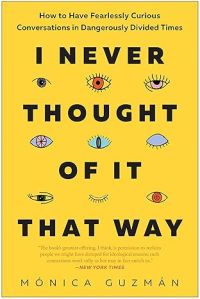
Journalist Mónica Guzmán’s I Never Thought of It That Way motivated my recent spate of communication-related reads. Guzmán’s life’s work revolves around cross-partisan communication, which may or may not have something to do with the fact that she’s the liberal daughter of Mexican immigrants who happened to vote for Trump—twice. In her book, she writes of how we might turn toward each other in support of mutual understanding and empathy, rather than turning away. She delves into how we might find common ground, and how we might find expansiveness within our conversations with others if only we approach them in the spirit of open curiosity.
As someone who has recently been grappling with the grief and anger that comes with family estrangement (due to unpolitical reasons), I appreciated Guzmán’s point of view.
As a journalist who sometimes interviews folks on the other side of the political spectrum, and as a human who has to live in the world with other humans, I appreciated this hopeful approach to cross-partisan discourse.
Calling In: How to Start Making Change with Those You’d Rather Cancel by Loretta J. Ross
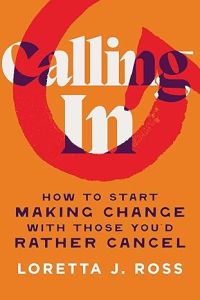
I mentioned in my previous post on contentious conversations the importance of determining whether a situation calls for a call out or a call in.
As a reminder, the act of calling someone out involves calling attention to one’s problematic rhetoric or behavior. Calling in, meanwhile, also attempts to address one’s problematic behavior, but is done in a much more compassionate and patient way.
In Calling In, activist Loretta J. Ross has created an entire book devoted to making those judgment calls over whether a call out or a call in is called for. She then digs into how one might successfully call someone in—or how one might gracefully respond to being called in themselves.
This book isn’t out until February, but it’s well worth the pre-order.
Loving Corrections by adrienne maree brown
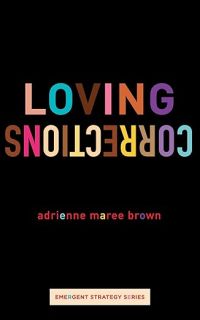
Writer and activist adrienne maree brown is a favorite here at Feminist Book Club. I’ve raved about Grievers on the podcast. Ashley has name dropped We Will Not Cancel Us in her Educate & Activate post on cancel culture, and also in a separate post that asks: to cancel or not to cancel? And I feel as if Pleasure Activism has been on everyone’s lips for years, particularly in my sex educator circles.
Her latest, Loving Corrections, feels like a natural companion to We Will Not Cancel Us, and also a natural next item on this list after the Ross book. It’s also a book that our Editor-in-Chief, Natalia, literally won’t stop recommending to people.
That’s because this book feels like a collection of call-ins (though, throughout the book, brown refers to them as ruminations). In this first section of brown’s book, there are ruminations on racism, ableism, ego, family, and more.
Later, in a section titled Murmurations (from her column of the same name in YES! magazine), brown explores accountability, personal and otherwise. As she writes in her book, these columns analyze the root causes of various social problems, and share models for systemic, structural change.
I recommend this for those who could stand to be lovingly called in themselves. Go ahead. Sit with the discomfort.
See No Stranger: A Memoir and Manifesto of Revolutionary Love by Valarie Kaur
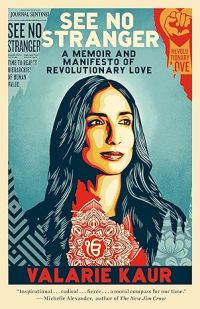
I wrote about See No Stranger for Feminist Book Club back in 2020, and about how Kaur advocates for what she refers to as revolutionary love. I include it on this list because, much like the other books here, it is about breaking out of the echo chambers we’re each living in and turning toward each other.
What is revolutionary love? This type of love, writes Kaur, is one in which we can look at one another and think, “You are part of me I do not yet know.”
Like the other authors on this list, Kaur is a cheerleader for open curiosity as a means to find understanding, forgiveness, and a way forward.
Civil Unity: The Radical Path to Transform Our Discourse, Our Lives, and Our World by Shola Richards
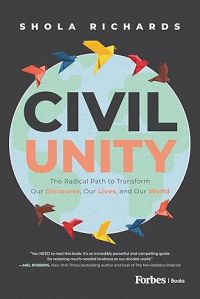
In Civil Unity, keynote speaker and author Shola Richards puts to rest the idea that prioritizing civility equates to being so agreeable, we don’t take a firm stand against the policies and people trying to harm us and our loved ones. According to Richards, engaging in civil discourse instead means choosing to turn toward each other in an attempt to reach mutual understanding and transform our world for the better.
In chatting with a friend about Guzmán’s book the other month, she admitted that she had difficulty getting on board with the idea of approaching others with open curiosity. She didn’t care why people had voted for Trump. She didn’t want to know the reasoning behind their support of what we saw as despicable policies and beliefs. Either way, those folks were endangering her life, the lives of her loved ones, and the lives of all those within other marginalized communities. Whatever the reason, she saw those choices as unforgiveable. She saw them as uninformed and hateful.
I wasn’t sure what to say to her then. Which is why I so appreciated Civil Unity, which dug into when it makes sense to engage in civil discourse (and how), and when it might make more sense to step away from a conversation and set boundaries in order to prioritize one’s mental health.
It’s why I appreciated all of these books, which showed that we can still be surprised by those we see as unreachable.
Over and over again, these authors were faced with those they had every reason to hate. Instead, they turned toward them with compassion and curiosity. And that has made all the difference in their lives.


